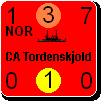BJ, I have to admit, whether the supply system needs more attention certainly is a matter of taste.

However, what I miss in wargaming is the need to actually plan your operations months in advance in some cases. For instance:
1. Victualling (preparing/loading the supplies) for your naval expedition was something that had to be planned in the fall of the preceeding year. You had to know how many ships you would have out and for approximately how long. Why? Because packaging and salting the food could only be done in the winter months. Which meant that the orders had to be placed around October of the previous year at the latest. In CoG:EE navies are ready to sail anywhere anytime at the drop of a hat. Yet there are several instances in 18th century warfare where due to lack of victuals, British fleets were forced to turn back or abandon operations. Indeed in the 1660s (yes, another era entirely), the English fleet was forced to give up the successful and useful blockade of the United Provinces after one (1!) month because the supply system virtually collapsed because the ships were "more than 100 miles from their base". Interestingly, the English navy had hundreds of ships at its disposal to send home for supplies. In addition to a vast merchant fleet (growing by the day due to captured Dutch vessels), they actually had over 100 ships in battle for some engagements! But a 100 mile supply chain was too complicated to deal with.
2. Somehow players should be able to decide on which points (for instance, which islands in the Mediterranean) become naval and supply points for their fleets. If the location in question wasn't a thriving port of trade (the preferrable situation) capable of discounting bills and providing everything you needed, you had to ship everything there at no minor cost--yes, even "major cost". Indeed, naval supply bases are so important I have read descriptions of admirals falling back on them to keep them in friendly hands rather than continue a blockade. There is absolutely no incentive for this in CoG:EE. Of course, the role of naval bases is totally under represented in CoG:EE. Large benefits flowed from carrying out operations in a region with a friendly naval base or with one which you could purchase supplies at. Sure, you could "forage" for some food in neutral and friendly regions and this was done, but the essential supplies of twine and spare masts and canvas could only be brought in from home.
3. Preparing frontier magazines with flour for hundreds of thousands of man-months took time. If you were France and planned your operations for the Belgian frontier and suddenly decided that you wanted to send your hundreds of thousands of men south into Italy instead, it could take months just to redeploy the food. Louvois, who worked for Louis XVI and developed the magazine system, demonstrated that feats of organization and logistics were not 1 month affairs. For an amazing look at some of the issues of supplying an army, see "Feeding Mars" by Lynn--its really the best 1 volume work on logistics I have ever seen. Lynn specializes in 18th century logistics and does a lot of primary research in the field (he is in Paris right now as I write this, doing primary research on the fascinating aspects of supply in the era).
4. In CoG:EE it is impossible to prepare specific points (magazines/fortresses) in the game to withstand a several month long siege...unless they are supply sources. Although they are supply sources in the new CoG:EE patch, the fortress of Berlin and Breslau had at least a year of supply for 60,000 or 70,000 men by the time of Frederick the Great's death. Players should be able to do this in any frontier region with enough time.
5. In CoG:EE, there is no way to represent over-extended or compromised supply lines. You are either "in supply" or out of it. In the Russian advance into Prussia in the Seven Years' War the extended supply line over very poor roads often threatened the advance with total collapse. Yes, they were still "in supply", but barely. And every captured magazine was surely a godsend.
6. The problem of the supply of food, fodder, ammunition, naval stores, and victuals each put totally different demands on the system are required different kinds of advanced planning.
It is such aspects of war which separated the men from the boys. And the victors from the vanquished. Just as much as any maneuver on any battlefield ever did.
Such elements make the problem of warfare interesting to me personally. However, they may be dry as pants to others. But switching lines of communication at the drop of a hat and not having to plan out operations months in advance is rather boring to me and lacks real challenge. That is just my two cents. But I am still a fan of the game.

Actually, what I am for is a "basic" supply system (leaving CoG:EE as is) and an advanced one which takes the issues discussed above into some account.





